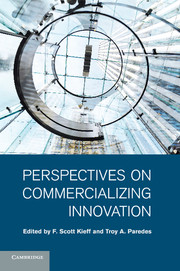Book contents
- Frontmatter
- Contents
- Contributors
- Dedication
- Acknowledgments
- Introduction
- Part I Perspectives on Theories of Intellectual Property
- Part II Perspectives on the Problems of Anticommons and Patent Thickets
- 6 Engineering a Deal
- 7 Understanding the RAND Commitment
- 8 Embryonic Inventions and Embryonic Patents
- 9 Innovation and Its Discontents
- Part III Perspectives on Finance and Commercialization
- Part IV Perspectives on the University Innovation
- Part V Perspectives on International Considerations
- Index
- References
9 - Innovation and Its Discontents
from Part II - Perspectives on the Problems of Anticommons and Patent Thickets
Published online by Cambridge University Press: 05 December 2011
- Frontmatter
- Contents
- Contributors
- Dedication
- Acknowledgments
- Introduction
- Part I Perspectives on Theories of Intellectual Property
- Part II Perspectives on the Problems of Anticommons and Patent Thickets
- 6 Engineering a Deal
- 7 Understanding the RAND Commitment
- 8 Embryonic Inventions and Embryonic Patents
- 9 Innovation and Its Discontents
- Part III Perspectives on Finance and Commercialization
- Part IV Perspectives on the University Innovation
- Part V Perspectives on International Considerations
- Index
- References
Summary
Over the course of the 19th and 20th centuries, the United States evolved from a colonial backwater to become the preeminent economic and technological power of the world. The foundation of this evolution was the systematic exploitation and application of technology to economic problems: initially agriculture, transportation, communication and the manufacture of goods, and then later health care, information technology, and virtually every aspect of modern life.
From the beginning of the republic, the patent system has played a key role in this evolution. It provided economic rewards as an incentive to invention, creating a somewhat protected economic environment in which innovators can nurture and develop their creations into commercially viable products. Based in the U.S. Constitution itself, and codified in roughly its modern form in 1836, the patent system was an essential aspect of the legal framework in which inventions from Edison's light bulb and the Wright brothers’ airplane to the cell phone and Prozac were developed.
- Type
- Chapter
- Information
- Perspectives on Commercializing Innovation , pp. 268 - 300Publisher: Cambridge University PressPrint publication year: 2011
References
- 4
- Cited by



